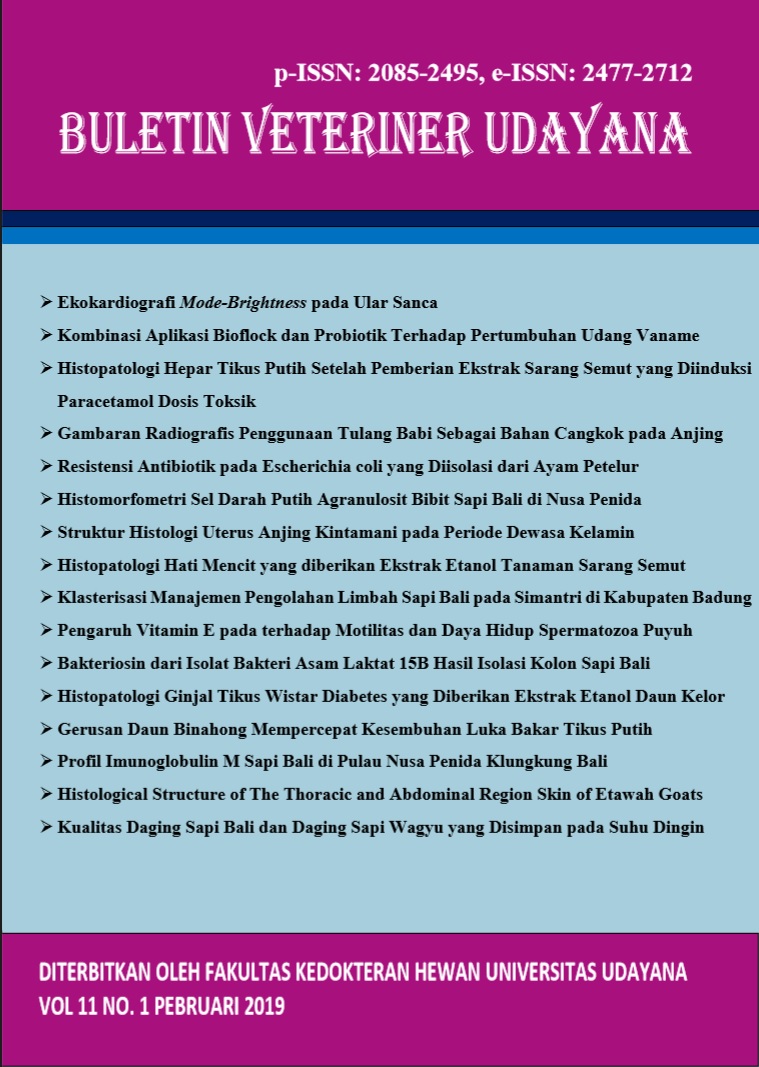Gambaran Radiografis Penggunaan Tulang Babi Sebagai Bahan Cangkok Untuk Penanganan Fraktur Femur Pada Anjing
Abstrak
Fraktur merupakan salah satu kasus yang dapat terjadi pada hewan kesayangan terutama anjing dan kucing. Prinsip penanganan kasus fraktur yaitu melakukan reposisi dan imobilisasi pada daerah fraktur. Kerusakan tulang yang besar karena trauma dapat menghambat kesembuhan dan menyebabkan cacat tulang, sehingga diperlukan bahan cangkok tulang untuk merangsang proses penyembuhan dan untuk mengisi bagian tulang yang hilang. Penelitian ini bertujuan untuk mempelajari gambaran radiografis penggunaan tulang babi sebagai bahan cangkok untuk penanganan kasus fraktur pada anjing. Delapan ekor anjing jantan umur 3-4 bulan digunakan dalam penelitian ini, yang dibagi menjadi 2 kelompok secara acak. Kelompok I berjumlah 2 ekor adalah Anjing yang dipergunakan sebagai kontrol, yaitu anjing pada diaphysis tulang femurnya dibor dengan diameter 1 cm tanpa pemberian bahan cangkok. Kelompok II berjumlah 6 ekor dibor seperti kelompok I dan diberi bahan cangkok. Monitoring perkembangan kesembuhan dilakukan berturut-turut pada 24 jam, minggu ke-2, ke-4 dan ke-8 pasca operasi dengan pemeriksaan foto rontgent. Hasil analisis radiografis menunjukkan telah terjadi penyatuan dan mineralisasi fragmen tulang pada minggu kedelapan pasca operasi pada kelompok II dengan densitas tulang sudah tampak normal.
##plugins.generic.usageStats.downloads##
Referensi
Bigham AS, Dehghani SN, Shafiei Z, Nezhad ST. 2009. Experimental bone defect healing with xenogenic demineralized bone matrix and bovine fetal. Growth plate as a new xenograft: radiological, histopathological and biomechanical evaluation. Cell Tissue Bank. 10:33–41.
Finkemeier CG. 2002. Bone Grafting and Bone Graft substitutes. J Bone Joint Surg Am. 84: 454-464.
Frost HM. 1989. The biology of fracture healing: An overview for clinicians. Part I. Clin. Orthop. 248: 283-293.
Graham J P. 2007. When To Panic About That Fracture Repair. 79th Western Veterinary Conferences.
Greenwald AS, Bodes SD, Goldberg. 2008. Bone-Graft Substitutes: Fact, fictions and applications. 75th Annual Meeting American Academy of Orthopaedic Surgeons. March 5-9, 2008. San Francisco, California.
Harwood PJ, Newman JB, Michael ALR. 2010. An update fracture healing and non union. Orthopedics and Trauma. 24:1. Nannmark, U. and Sennerby, L. 2008. The bone tissue responses to prehydrated and collagenated corticocancellous porcine bone grafts: a study in rabbit maxillary defects. Clinical Implant Dentistry & Related Research 10: 264-270.
Larsen LJ, Roush JK, McLaughlin RM. 1999. Bone plate fixation of distal radius and ulna fractures in small and miniature-breed dogs. J Am Anim Hosp Assoc, 35:454-464.
Nannmark U, Sennerby L. 2008. The bone tissue responses to prehydrated and collagenated corticocancellous porcine bone grafts: a study in rabbit maxillary defects. Clinical Implant Dentistry & Related Research 10: 264-270.
Olmstead ML. 1995. Fractures of Bone of the hind limb. In Small Animal Orthopedics. M.L. Olmstead and F.J. paros ed. Mosby-year Book Inc. St. Louis.pp.219-243.
Orsini G, Scarano A, Piatelli M, Piccirilli M, Caputi S, Piattelli A. 2006. Histologic and ultrastructural analysis of the regenerated bone in maxillary sinus augmentation using a porcine bone derived biomaterial. Journal of Periodontology 77:1984-1990.
Pearce IA, Richards RG, Milz S, Schneider E, Pearce SG. 2007. Animal model for implant biomaterial research in bone: A review. European Cells and Materials. Vol. 13: 1-10.
Piermattei D, Flo G, DeCamp C. 2006. Handbook of Small Animal Orthopedics and fracture Repair. Fourth edition. Saunders Elsevier. St. Louis Missouri. 63146.
Plata DV, Scheyer ET, Mellonig JT. 2002. Clinical comparison of an enamel matrix derivative used alone or in combination with a bovinederived xenograft for treatment of periodontal osseus defect in humans. J. periodontal. 73: 433-40.
Puricelli E, Corsetti A, Ponzoni D, Martins GL, Leite GM, Santos LA. 2010. Characterization of bone repair in rat femur after treatment with calcium phosphate cement and autogenus bone graft. J. Head and Face Med. 6:10.
Weisbrode SE. 1995. Function, structure, and healing of the musculoskeletal system. In Small Animal Orthopedics. M.L. Olmstead and F.J. Paras ed. Mosby Year Book Inc. St. Louis. Pp. 27-56.
Xu W, Spilker G, Weinand C. 2015. Methodological Consideration of Various Intraosseus and Heterotopic Bone Grafts Implantation in Animal Models. J Tissue Sci Eng. 6(3)





